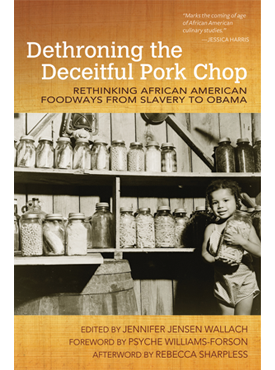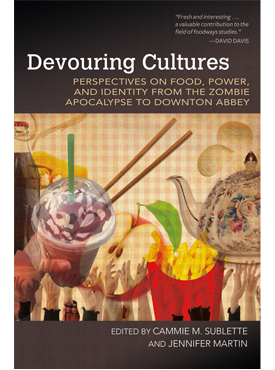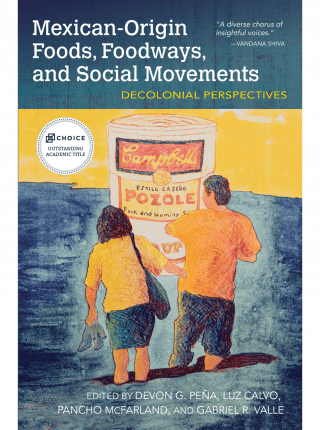2016 Choice Outstanding Academic Title
The fifteen essays collected in Dethroning the Deceitful Pork Chop utilize a wide variety of methodological perspectives to explore African American food expressions from slavery up through the present. The volume offers fresh insights into a growing field beginning to reach maturity. The contributors demonstrate that throughout time black people have used food practices as a means of overtly resisting white oppression—through techniques like poison, theft, deception, and magic—or more subtly as a way of asserting humanity and ingenuity, revealing both cultural continuity and improvisational finesse. Collectively, the authors complicate generalizations that conflate African American food culture with southern-derived soul food and challenge the tenacious hold that stereotypical black cooks like Aunt Jemima and the depersonalized Mammy have on the American imagination. They survey the abundant but still understudied archives of black food history and establish an ongoing research agenda that should animate American food culture scholarship for years to come.
Jennifer Jensen Wallach is an associate professor of history at the University of North Texas where she teaches African American history and United States food history. She is the author of How America Eats: A Social History of U.S. Food and Culture and the co-editor of American Appetites: A Documentary Reader.
Foreword, Psyche Williams-Forson
Psyche Williams-Forson is the author of Taking Food Public: Redefining Foodways in a Changing World and Building Houses out of Chicken Legs: Black Women, Food, and Power.
Part I: Archives
Chapter 1 – Foodways and Resistance: Cassava, Poison, and Natural Histories in the Early Americas
Kelly Wisecup
Chapter 2 – Native American Contributions to African American Foodways: Slavery, Colonialism, and Cuisine
Robert A. Gilmer
Chapter 3 – Black Women’s Food Writing and the Archive of Black Women’s History
Marcia Chatelain
Chapter 4 – A Date with a Dish: Revisiting Freda De Knight’s African American Cuisine
Katharina Vester
Chapter 5 – What’s the Difference between Soul Food and Southern Cooking? The Classification of Cookbooks in American Libraries
Gretchen L. Hoffman
Part II: Representations
Chapter 6 – Creole Cuisine as Culinary Border Culture: Reading Recipes as Testimonies of Hybrid Identity and Cultural Heritage
Christine Marks
Chapter 7 – Feast of the Mau Mau: Christianity, Conjure, and the Origins of Soul Food
Anthony J. Stanonis
Chapter 8 – The Sassy Black Cook and the Return of the Magical Negress: Popular Representations of Black Women’s Food Work
Kimberly D. Nettles-Barcelón
Chapter 9 – Mighty Matriarchs Kill It with a Skillet: Critically Reading Popular Representations of Black Womanhood and Food
Jessica Kenyatta Walker
Chapter 10 – Looking through Prism Optics: Toward an Understanding of Michelle Obama’s Food Reform
Lindsey R. Swindall
Part III: Politics
Chapter 11 – Theft, Food Labor, and Culinary Insurrection in the Virginia Plantation Yard
Christopher Farrish
Chapter 12 – Dethroning the Deceitful Pork Chop: Food Reform at the Tuskegee Institute
Jennifer Jensen Wallach
Chapter 13 – Domestic Restaurants, Foreign Tongues: Performing African and Eating American in the US Civil Rights Era
Audrey Russek
Chapter 14 – Freedom’s Farms: Activism and Sustenance in Rural Mississippi
Angela Jill Cooley
Chapter 15 – After Forty Acres: Food Security, Urban Agriculture, and Black Food Citizenship
Vivian N. Halloran
Afterword, Rebecca Sharpless
Rebecca Sharpless is the author of Cooking in Other Women’s Kitchens: Domestic Workers in the South, 1865–1960.
“Timely and illuminating, these essays set a new standard for food studies…. An exciting read.”
—CHOICE, June 2016
“By using African American food as a window on both culture and nature, these chapters advance the still developing subfield of African American environmental history. Even more, these essays and other materially oriented scholarship in ethnic food history can help US environment historians write accounts that better reflect American diversity.”
—H-Net (H-Environment) Reviews, February 2016
“Overall, the collection is a great contribution to our growing understanding, not only of African American foodways, but also of the social and political dynamics that have shaped, and still impact, the way we eat and think about our food in the US.”
—Fabio Parasecoli, Huffington Post
“Dethroning the Deceitful Pork Chop formally marks the coming of age of African American culinary studies. The work amply proves that it is a very real academic discipline with range and rigor. As one who was around at its birth, I’ve got to say after examining the essays included that the youngster looks very healthy indeed. Bravi Tutti!”
—Jessica Harris, author of High on the Hog: A Culinary Journey from Africa to America

Food and Foodways, a series from the University of Arkansas Press, explores historical and contemporary issues in global food studies. We are committed to telling lesser known food stories and to representing a diverse set of voices. Our strength is works in the humanities and social sciences that use food as a lens to examine broader, social, cultural, environmental, ethical, and economic issues. In addition to scholarly books, we publish creative nonfiction that explores the sensory dimensions of consumption and celebrates food as evidence of human creativity and innovation.
Jennifer Jensen Wallach, Series Editor Jennifer.Wallach@unt.edu
Winner of the 2017 Association for the Study of Food and Society Award, best edited collection.

Adopted at: Colorado Mesa University
Course: HIST 396 History of Food in the US
Course Description: This course interweaves a unique and understudied cultural history of food into the larger context of American history. Examining the purpose of food and its relationship to social, political, and economic trends highlights the ways in which our country has become a global leader in food preparation, production, and consumption. This semester, we will investigate the social and cultural history of America’s relationship with food beginning with the foundational foods of the new world and concluding with contemporary food issues.
Professor: Erika Jackson
Term: Fall 2022
Adopted at: University of West Georgia
Course: HIST 4477, The New South
Course Description: A study of the American South since 1865, including the interaction of economic, political, social, and cultural factors, especially in the context of struggles in rural and urban communities and in the textile industry.
Professor: Julia Brock
Term: Spring 2017






